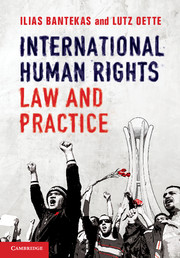Book contents
- Frontmatter
- Contents
- List of abbreviations
- Table of Cases
- Introduction
- 1 International human rights law and notions of human rights: foundations, achievements and challenges
- 2 International human rights law: the normative framework
- 3 Human rights in practice
- 4 The United Nations Charter system
- 5 The UN human rights treaty system
- 6 Regional human rights treaty systems
- 7 Individual complaints procedures
- 8 Civil and political rights
- 9 Economic, social and cultural rights
- 10 Group rights: self-determination, minorities and indigenous peoples
- 11 The human rights of women
- 12 The right to development, poverty and related rights
- 13 Victims’ rights and reparation
- 14 The application of human rights in armed conflict and the international criminalisation process
- 15 Human rights and counter-terrorism
- 16 Non-state actors and human rights
- 17 Globalisation and its impact on human rights
- Index
- References
10 - Group rights: self-determination, minorities and indigenous peoples
- Frontmatter
- Contents
- List of abbreviations
- Table of Cases
- Introduction
- 1 International human rights law and notions of human rights: foundations, achievements and challenges
- 2 International human rights law: the normative framework
- 3 Human rights in practice
- 4 The United Nations Charter system
- 5 The UN human rights treaty system
- 6 Regional human rights treaty systems
- 7 Individual complaints procedures
- 8 Civil and political rights
- 9 Economic, social and cultural rights
- 10 Group rights: self-determination, minorities and indigenous peoples
- 11 The human rights of women
- 12 The right to development, poverty and related rights
- 13 Victims’ rights and reparation
- 14 The application of human rights in armed conflict and the international criminalisation process
- 15 Human rights and counter-terrorism
- 16 Non-state actors and human rights
- 17 Globalisation and its impact on human rights
- Index
- References
Summary
Introduction
Rights pertaining to groups, as opposed to individual members thereof, are also known as collective rights or solidarity rights. However, not every conceivable group possesses such rights by the mere fact that it is organised as a collectivity (e.g. political parties, activists, disabled groups and others are not endowed with collective rights). Rather, collective rights are limited to particular groupings and are typically conferred by treaty, soft law or customary international law. They are premised on the rationale that certain entitlements are meaningless outside the group and that their justiciable character is dependent on the group’s continued existence and coherence. Thus, the notion of statehood is redundant without a stable population that wishes to form a nation and it is exactly in this populace, through its duly appointed representatives, that the state finds expression. As a result, the powers of the state are vested in its people and it is natural that they be endowed with entitlements that cannot be conferred on discrete individuals. By way of illustration, although the right to elect and be elected is meaningful in its personal dimension, the choice to form, secede or unite with another state cannot be exercised individually. Instead, such decisions are best taken by the affected collectivity acting as a single corpus in accordance with predefined rules. General international law informs a large part of the discussion on group rights, albeit, as will become evident, human rights considerations have increasingly been viewed as central to the rights of peoples.
- Type
- Chapter
- Information
- International Human Rights Law and Practice , pp. 409 - 451Publisher: Cambridge University PressPrint publication year: 2013



